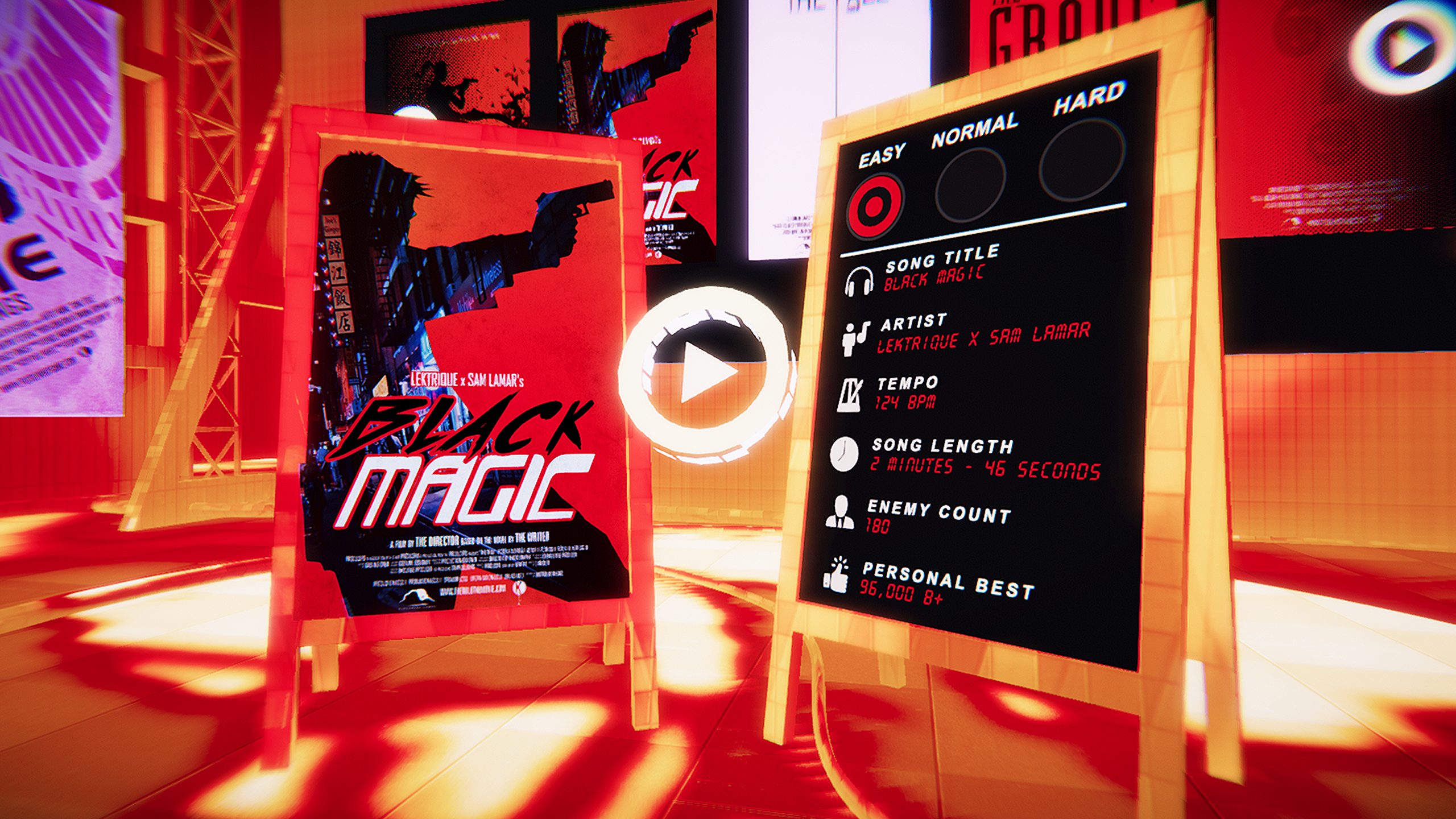Designers at Canada-based Cloudhead waste no time in their latest game. Pistol Whip basically points a gun at your head and says “dodge this.” You better move, or you’re going down like just another agent in The Matrix.
The VR game debuts Nov. 7 across most major headsets including Quest, Index, Rift and Vive (with a PSVR version in the works), and the software wears its inspirations on stylish sleeves. If you’ve played Superhot, you can see that game the moment you hear the words “Pistol…Whip” at scene selection. Beat Saber’s influence is obvious, too, but so are the fantasies of generations who grew up watching action movies like James Bond, Die Hard, Kingsman and John Wick.
That’s the level upon which Pistol Whip’s foundation is laid firmest. It is a VR game made for people who like movies where heroes get things done with a gun. Put another way, it should appeal to almost anyone who thinks Keanu Reeves looks good in a suit.
Symphony Of Bullets
I’ve spent nearly 40 hours with early versions of Pistol Whip on Valve Index and I see no end in sight to my time with the game. As I type this, my hand aches from gripping the controller too tightly, and for too long, replaying a single hard level in “Deadeye” mode.
The game launches with 10 levels, or “scenes” as Cloudhead calls them. Each scene — a catchy song licensed from Kannibalen Records — is mapped to a continuous three-to-five minute path through colorful glowing stages. Each scene amounts to a dreamy re-imagining of chase or gun-battle scenes from action movies. There are easy, medium and hard difficulties for each scene and they are all built around an auto-aim system tuned to help a wide selection of players slip into this power fantasy.
Auto-aim
The auto-aim ensures everyone playing Pistol Whip is a highly skilled marksman relentlessly pulled forward through each level. Enemies sprint into place and align themselves at a series of predefined moments along the path. When they fire you’ve got some time to move your head out of the way. There are really only three main enemy types and they differ visually just enough to tell you they need one, two or four bullets to go down. There are, of course, more of the harder to break baddies on higher difficulties.
I put most of my time with the game into this auto-aim mode. Players are likely to find different play styles depending what you want to do. Going for a high score? Maybe start moving to the beat to help you place your bullets at the right moment. I found a satisfying flow state playing this way — a kind of dance with my heart thumping in my chest and shots colliding perfectly in sync with the music. I haven’t felt anything like it since, maybe, Mirror’s Edge.
Deadeye Modifier
I recently turned on the “Deadeye” modifier and, spoiler alert, turning auto-aim off is like that arc in a comic book hero’s journey where they lose their powers. I can’t yet beat a level on hard difficulty in this mode and I haven’t found that relaxing/exhilarating flow state I did in the main game. Honing my aim, though, also feels like an incredible challenge to undertake as well and one that’s likely to draw me back again and again. It also offers a 20% score bonus.
Pistol Whip Scoring
With auto-aim I’d memorized the spawn beats of enemies to such a degree, and became so aligned with the assistance, that I’d learned to take my shots fast and move my head so little that it didn’t take much energy anymore to dodge the occasional bullet and stay in command of a hard level. There are 200 points possible per shot summed from a combination of accuracy and on-beat shooting. “Deadeye” mode, then, is there for players who want “training accuracy or as a high-level challenge,” according to Cloudhead.
What About Custom Songs?
Some VR players may turn Deadeye on way quicker than I did — it wasn’t in earlier builds I tried — and I’m far from what anyone would call “good” at shooter games. So many players will probably exhaust the game’s levels way faster than me. Cloudhead’s official comment on “custom” music is that “because Pistol Whip levels are complete scenes rather than ‘voids’ like in traditional rhythm games, custom tracks are a more complicated process. However, we have solutions in mind that we are excited to address after launch.”
The studio is also planning “more free and paid songs/scenes for after launch.”
Hype Train Pulling Into The Station
Game reviews are embargoed by Cloudhead until release of the game at 10 am Pacific on Nov. 7. In all my time with the game I’ve only played five of the 10 completed songs. We should have our hands on a finished build of the game with plenty of time to develop a full review, but for now Cloudhead’s lifted the embargo on initial impressions.
So, here it is then. Pistol Whip’s consumed me for much of 2019. Cloudhead announced the game as part of our E3VR showcase this summer and when I went on vacation I took the Valve Index and its base stations with me because I expected Cloudhead to send me a build during the trip. They did, and my family is still mad at me for playing it in the other room so much instead of visiting with them. I was so impressed by what I played I got a passport and booked the multi-flight journey out to visit their office in Canada and interview the development team face-to-face so I could understand their journey toward this game.
For roughly seven years now I’ve obsessed over the promises of VR technology and I’ve been a fair bit skeptical the entire time. I wish VR would allow more people to work from home while empowering more folks to spend meaningful time with their families. Maybe that’s the future of VR — I hope it is — but the fun I’ve found in Pistol Whip tells me something Cloudhead seemed to realize in its journey from two Myst-like VR games and Aperture Hand Labs to this one.
First, we’ll need guns. Lots of guns.
You can wish list Pistol Whip at the following links:
- Steam: http://bit.ly/pwvr-steam
- Oculus Rift: https://ocul.us/2mneZJh
- Oculus Quest: https://ocul.us/2kROxHk
- Viveport: http://bit.ly/pwvr-viveport
We’ll have more for you in the coming days about Pistol Whip.





























